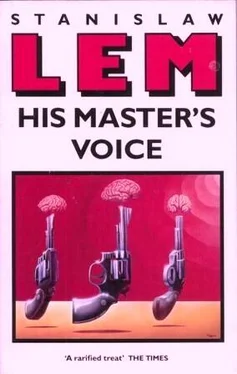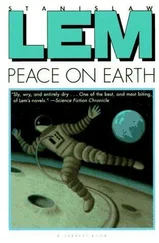I washed my face in cold water and went out. As I passed Nye’s door at the end of the corridor, I noticed that his light was on, and involuntarily softened my footsteps. Conscious of the absurdity of this action, I smiled a crooked smile, which stretched the skin of my face — making it feel stiff and leathery, as if not my own — and ran down the stairs instead of summoning the elevator.
Never before had I left the hotel at that hour. The lobby was dark; I bumped into chairs set about; there was a full moon, but the concrete block at the entrance shut out its light. The street, on the other hand, looked uncanny, but perhaps it only seemed so to me. On the administration building shone the ruby lights that warned airplanes; other than that, there were only a few lamps at the intersections. The physics building was dark and appeared deserted, but, going the way I knew by heart through the half-open door, I made it to the main hall. Immediately I knew that the thing was over, because the signals that flashed red while the inverters were in operation were all dark. In the dimness of the hall the giant ring of the inverter made the place seem like the, engine room of a factory or ship; the tiny indicator lights at the consoles were still blinking on and off, but I found no one by the chamber. I knew where Donald would be; the narrow passageway between the coils of the multi-ton electromagnets led to a small interior area in which there was a kind of cubicle, where Donald kept all his records, films, notebooks. And, in fact, I saw a light on. He jumped up when he saw me. McHill was with him. Without a word of explanation he handed me the scrawled sheets of paper.
I was not aware of the state that I was in until I found that I could not identify the symbols, though I was perfectly familiar with them — I stared stupidly at the columns of figures, trying to collect my thoughts. When finally the significance of the coordinates of the four runs of the experiment sank in, I felt a weakness in my knees.
By the wall was a stool. I sat on it and once again, carefully and slowly, went over the results. The paper suddenly went gray; something obscured my vision. This weakness lasted only a few seconds. When it passed, I was covered with a clammy sweat. Donald at last noticed that something strange was happening to me, but I said that I was better now.
He started to take back the notes, but I did not let him. I still needed them. The greater the energy was, the less accurate the localization of the explosion. Although four trials did not allow statistical analysis, the relation hit one in the face. Probably for charges over a microton (we cheerfully worked in units of nuclear ballistics) the error factor would equal half the distance between the point of detonation and the target. Three, at most four, more tests would be enough now to determine this exactly, and enough to make the uselessness of TX as a weapon a certainty. But I was already certain, because suddenly, with extraordinary clarity, I recalled all the preceding results as well as my wrestling to come up with a model for a phenomenological formula. The relation appeared before me, the true formula for the whole thing, incredibly simple; it was nothing but the transposition, to the TX effect, of the uncertainty principle: the greater the energy, the less the accuracy of the focus, and the less the energy, the more sharply one could focus the effect. At distances on the order of a kilometer, it would be possible to focus the effect to a target area the size of a square meter, exploding only a handful of atoms. No powerful blow, no destroying force, nothing.
When I lifted my eyes, I saw that Donald knew also. A few words sufficed. There was only one problem: further experimentation, at energies increased by an order of magnitude — necessary to put an end, once and for all, to the career of TX — would have to be dangerous, because the indeterminacy of the place where the energy would be released, its shifting — completely unpredictable — would imperil the experimenters. What we needed was some special proving ground, a desert. . and an apparatus on far remote control. This, too, Donald had thought of. We said little; over us hung a naked, dusty light bulb. McHill, all this time, did not utter a word. It seemed to me that the man was not so much shocked as — almost — disappointed; but perhaps I am doing him an injustice.
We went through everything again, with extreme care; my thinking was so clear, I was able on the spot to trace out the dependence, extrapolating for even greater charges, those in the kiloton range, and then going in the opposite direction — for our previous results. The agreement was to three decimal places. At one point, Donald looked at his watch. It was already five. He threw the main switch to cut off the power from all the units, and together we left the laboratory. Outside there was daylight. The air was cold as crystal. McHill walked away, but we stood awhile in front of the hotel, in an unreal stillness and an isolation so complete, it was as if no one but us was left alive. The thought made me shudder — but now only in retrospect, a reflex of memory. I wanted to say something to Donald, something that would wrap it all up, that would express my relief, my joy, but suddenly I realized that I felt no joy. I was only empty, terribly exhausted, indifferent, as though nothing would or could happen now. I do not know whether he felt the same way. We shook hands, a thing we usually did not do, and went our separate ways. If someone lunges with a knife and the blade is deflected by hidden armor, he who struck the ineffective blow can take no credit.
We decided to present the story of the TX effect at the Science Council, but after three days; a little time was needed to organize the results properly, put together more detailed observational records, and make enlargements of selected photographs. But the very next day, at noon, I went to Yvor. He took the news remarkably calmly; I had underestimated his self-control. Most of all he was offended that we had not let him in on the secret until the end. I said many things to him on this score, finding myself in a position opposite the one I had been in upon my arrival at the compound: that time, he had done his best to “explain” my prior exclusion. But this matter was of incomparably greater importance.
I used every conceivable argument to sweeten the pill — to the accompaniment of his grumbling. For a while he held a grudge, understandably, though in the end he came to appreciate our reasons, I think. In the meantime, Donald, in the same private way, informed Dill, so that the only one who found out about everything at the meeting was Eugene Albert Nye. As much as I detested the man, I had to admire him: he did not bat an eye during Donald’s presentation, and I watched him the entire time. The man was a born politician, though not a diplomat — because a diplomat should not be vindictive, whereas Nye, almost a year after that meeting, when the Project had concluded its existence, with the help of a third party, a certain journalist, gave to the press a truckload of material in which the action Donald and I had taken, put in a certain light with typical commentary, occupied the place of honor. But for Nye, the matter never would have taken on the sensational aspect that obliged various high-placed people, among them Rush and McMahon, to come to our rescue.
As the reader can see, if Donald and I were guilty of anything, it was of illogic, because in one way or another our secret research eventually had to be grist for the Project’s official mill. But the whole thing was depicted as an extremely harmful piece of bungling, as a heinous attempt to sabotage the Project: instead of going immediately to the qualified experts (which meant the Army’s ballistic-missile people), we had puttered about like do-it-yourself handymen, on a small scale, thereby giving the “other side” an opportunity to overtake us — and get the jump on us, fatally.
Читать дальше












